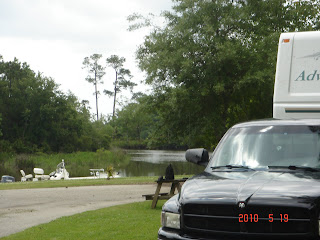Mississippi Gulf Coast
We left New Orleans on May 18 and headed for the Mississippi Gulf Coast. This area is made up of Biloxi, Gulfport and Bay St. Louis. The entire area has a Beach road that runs right beside the beautiful white sand beaches. One of the things that immediately strikes you is that on one side of the road is beautiful beach and on the other side there is vacant property. In every other place in the world this property would be gobbled up by developers, but not here because everyone remembers what Hurricane Katrina (August 2005) did to the houses along this street. As we learned, the most violent winds from Katrina actually hit this area, not New Orleans. The big problem in New Orleans was flooding as a huge surge wave devastated the levy system in the city. In the Gulf Coast region the wind tore the place to pieces and they also had a surge wave that came through downtown. Before Katrina, this area had 728 houses registered with the Registrar of Historic sites; after Katrina there were only 18 that they could save. While I was there I played the Great Southern Golf Club that was established in 1908 and back then, it had a beautiful clubhouse overlooking the water. Now they still have the course but all that is left of the clubhouse is the cement foundation and a cement patio. They now operate out of a construction trailer with no hope in the immediate future of rebuilding.
Since Katrina, the community has been rebuilt to a certain extent, largely due to the approval of Casino licenses. In this small area there are 11 massive casinos and many of them have championship golf courses on their property. A couple of them have RV campsites on the property as well.
We found a nice campsite called Parker’s Landing and we were located with a view of a nice meandering canal. One day we went to lunch on the beach and the restaurant had just implemented a surcharge on all their seafood dishes because of the rising cost of seafood because of the Gulf oil spill. That was our first experience with the ramifications of the spill. Since then we have seen a lot of oil collection booms being spread across the front of the beaches and wetlands.

No comments:
Post a Comment